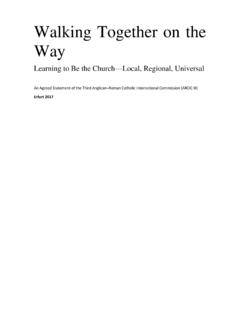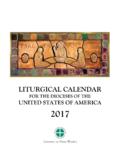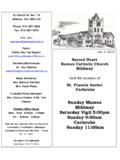Transcription of THE DIOCESE OF DALLAS - Our Lady of Angels
1 1 THE DIOCESE OF DALLAS POLICY ON SEXUAL MISCONDUCT Revised December 2010 2 CCoonntteennttss Introductory Letter SECTION I: GENERAL PROVISIONS ARTICLE 1 Policy Statement ARTICLE 2 Definitions ARTICLE 3 Implementation of Policy ARTICLE 4 Pastoral Support and Outreach ARTICLE 5 Education and Safe Environment ARTICLE 6 Ministerial Code of Conduct SECTION II: HANDLING COMPLAINTS OF SEXUAL MISCONDUCT ARTICLE 7 Reporting Sexual Misconduct to Civil Authorities ARTICLE 8 Reporting Sexual Misconduct to church Authorities ARTICLE 9 Complaints Against Diocesan Personnel: Investigation and Punishment Appendices A. Policies on Counseling and Therapy Services at Parish Parochial School or Diocesan High School B. Ministerial Code of Conduct C. Contact Information 3 Introductory Letter The opening pages of Sacred Scripture tell us of God's wondrous creation of a universe that is good.
2 The culmination of the whole of creation is when God breathes the divine spirit into the clay of the earth and brings forth humankind in His own image and likeness, male and female. Our sexual identity is an intimate part of God's plan for creation and therefore for each of us. The mystery of what it means to be a human being soul and body, spiritual and incarnate, and male and female is bound up in the very mystery of God, the author of life and the font of love. Human sexuality is God's creation, and we approach any discussion of it with a deep sense of appreciation, wonder and respect. However, it must be integrated with the other gifts we have received. Sexuality fully integrated in the human personality fosters human communication, and encourages and enriches all human relationships.
3 The moral and spiritual health of the church and human society depends on morally and spiritually healthy men and women who have learned to integrate the gift of sexuality with all the other gifts God gives them for the building up of the kingdom. Following the example of our Lord Jesus Christ, the church is deeply concerned for the well being of all people and has a special concern for those persons who are most susceptible. Thus, in accordance with the Essential Norms promulgated by the United States Conference of catholic Bishops ( USCCB ), the main (but not exclusive) focus of Diocesan policies on abuse has focused on minors. However, vulnerable adults are no less in need of such protection and this Policy on Sexual Misconduct reflects that reality. Sexual misconduct is always a tragedy and calls for the church to promptly respond with justice and compassion toward all those persons involved, especially the victims.
4 Therefore, the development and implementation of this policy has as its end the protection of the vulnerable, the pastoral care for those wounded or abused by misconduct, the protection of the rights of the accused, the appropriate action toward those responsible for sexual misconduct, and the respect due the church as a faith-community. 4 SECTION I: GENERAL PROVISIONS ARTICLE 1 Policy Statement The catholic church expects its priests, deacons, women religious and lay Diocesan and Parochial personnel to live chaste and moral lives, respecting in every way the gift of sexuality. Inappropriate sexual activity abuses the power and authority of the pastoral role of all who work for the people of God and serve them. The church also recognizes that all people are fallible and sin can occur, as can appropriate contrition and related forgiveness.
5 Nevertheless, sexual misconduct by any Diocesan Personnel within any of its institutions will not be tolerated. The purpose of this Policy is, first and foremost, to protect people from all forms of sexual misconduct involving Diocesan Personnel. Since 2002, the church has enforced a Zero Tolerance policy on sexual abusers. When even a single act of sexual abuse by a priest or deacon is admitted or is established after an appropriate process in accord with canon law, the offending priest or deacon will be removed permanently from ecclesiastical ministry, not excluding dismissal from the clerical state, if the case so All Diocesan and Parochial Personnel must comply with all applicable church , federal, state and local laws regarding incidents of actual, alleged or suspected sexual misconduct, and with the procedures outlined in this Policy.
6 The DIOCESE will work with civil authorities, parents, educators and various community organizations to make and maintain the safest environment possible for minors and vulnerable adults. The DIOCESE is responsible for promulgating and implementing this Policy on Sexual Misconduct in accordance with the laws of the church . These policies and procedures are complementary of and conform to the universal law of the church and in particular law the promulgated by the USCCB, the Charter for the Protection of Children and Young People and the Essential Norms for Diocesan/Eparchial Policies Dealing with Allegations of Sexual Abuse of Minors by Priests or 1 CIC, c. 1395 2; CCEO, c. 1453 1; Norm 8. 2 In 2002, the USCCB approved the Essential Norms and the same were promulgated by the President of the Conference on December 12, 2002, following the grant of the required recognition by the Congregation for Bishops.
7 In 2005, the members of the USCCB approved a revised version of the text. By a decree dated January 1, 2006, and signed by His Eminence, Giovanni Battista Cardinal Re, Prefect of the Congregation for Bishops, and His Excellency, the Most Reverend Francesco Monterisi, Secretary of the Congregation, the recognition originally granted to the Essential Norms of 2002 was extended to the revised version donec aliter provieatur. The President of the USCCB promulgated the Essential Norms of 2005 on May 5, 2006. On May 15, 2006, these Norms obtained force and now bind all Dioceses and Eparchies of the USCCB. See Norm 1. 5 ARTICLE 2 Definitions Child Abuse Any form of infliction of injury to the detriment of a child s physical, mental, moral, or emotional well being. Cleric Men ordained to the Roman catholic priesthood or deaconate and includes: a.
8 Clerics incardinated in the DIOCESE of DALLAS b. Clerics who are members of religious institutes and are assigned to pastoral work or teaching in the DIOCESE of DALLAS c. Clerics of other jurisdictions who are assigned to pastoral work or teaching in this DIOCESE d. Clerics who seek incardination in this DIOCESE e. Clerics who are retired or who request canonical faculties to do part-time or weekend-assistance ministry. DIOCESE / Diocesan Entities The Roman catholic DIOCESE of DALLAS , including but are not limited to parishes, schools, agencies, and institutions with direct accountability to the Bishop of DALLAS . Diocesan or Parochial Personnel Priests, deacons, lay Diocesan and Parochial employees and volunteers, independent contractors, women religious (sisters or nuns), religious brothers, seminarians and those enrolled in the Permanent Deacon Formation Program.
9 Minor Any person who has not reached his or her 18th birthday. Sexual Abuse An unlawful form of sexual misconduct, whether it involves a minor or a vulnerable adult. Sexual abuse of a minor or vulnerable adult includes sexual molestation or sexual exploitation of a minor or vulnerable adult and other behavior by which an adult uses a minor or vulnerable adult as an object of sexual gratification and as defined in Texas civil law. The transgressions in question relate to obligations arising from divine commands regarding human sexual interaction as conveyed to us by the Sixth Commandment of the Decalogue. Thus, the norm to be considered 6 in assessing an allegation of sexual abuse of a minor or vulnerable adult is whether conduct or interaction with a minor or vulnerable adult qualifies as an external, objectively grave violation of the sixth commandment (USCCB, Canonical Delicts Involving Sexual Misconduct and Dismissal from the Clerical State, 1995, ).
10 A canonical offense against the sixth commandment of the Decalogue (CIC, c. 1395 2; CCEO, c. 1453 1) need not be a complete act of intercourse. Nor, to be objectively grave, does an act need to involve force, physical contact, or a discernible harmful outcome. Moreover, imputability [moral responsibility] for a canonical offense is presumed upon external it is otherwise apparent (CIC, c. 1321 3; CCEO, c. 1414 2). Cf. CIC, canons 1322-27, and CCEO, canons 1413, 1415, and Preamble, USCCB, Essential Norms for Diocesan/Eparchial Policies Dealing with Allegations of Sexual Abuse of Minors by Priests or Deacons. Ultimately, it is the responsibility of the diocesan Bishop, with the advice of a qualified Review Board, to determine the gravity of the alleged act. Sexual Misconduct Includes the following types of behavior by Diocesan or Parochial Personnel: a.





